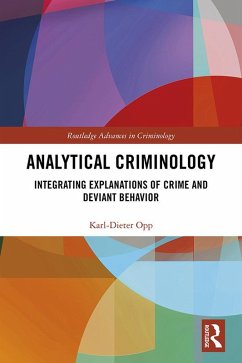
The Psychology of Criminal Conduct (eBook, PDF)
Versandkostenfrei!
Sofort per Download lieferbar
94,95 €
inkl. MwSt.
Weitere Ausgaben:

PAYBACK Punkte
47 °P sammeln!
The Psychology of Criminal Conduct, Seventh Edition, provides a psychological and evidence-informed perspective of criminal behavior that sets it apart from many criminological and mental health explanations of criminal behavior. Drawing upon the General Personality and Cognitive Social Learning theory, James Bonta and Donald Andrews provide an overview of the theoretical context and major knowledge base of the psychology of criminal conduct, discuss the eight major risk/need factors of criminal conduct, examine the prediction and classification of criminal behavior along with prevention and r...
The Psychology of Criminal Conduct, Seventh Edition, provides a psychological and evidence-informed perspective of criminal behavior that sets it apart from many criminological and mental health explanations of criminal behavior. Drawing upon the General Personality and Cognitive Social Learning theory, James Bonta and Donald Andrews provide an overview of the theoretical context and major knowledge base of the psychology of criminal conduct, discuss the eight major risk/need factors of criminal conduct, examine the prediction and classification of criminal behavior along with prevention and rehabilitation, and summarize the major issues in understanding criminal conduct. This book also offers the Risk-Need-Responsivity (RNR) model of assessment and treatment that has guided developments in the subject throughout the world.
Bonta carefully maintains the book's original contributions while presenting core concepts succinctly, clearly, and elegantly. Appropriate for advanced undergraduates and graduate students as well as for scholars, researchers, and practitioners, The Psychology of Criminal Conduct, Seventh Edition, further extends and refines the authors' body of work.
The book is extended and enhanced by a website that includes:
*located under the Student Resources menu, organized by chapter
**located under password-protected Instructor Resources
Bonta carefully maintains the book's original contributions while presenting core concepts succinctly, clearly, and elegantly. Appropriate for advanced undergraduates and graduate students as well as for scholars, researchers, and practitioners, The Psychology of Criminal Conduct, Seventh Edition, further extends and refines the authors' body of work.
The book is extended and enhanced by a website that includes:
- A curated selection of videos, webinars, and podcast episodes, bringing together diverse voices from leaders across the field of corrections and criminal psychology*
- Technical notes providing additional context and detail to concepts explored in the book*
- Interactive quizzes to test understanding and support study*
- Lecture slides, exercises, and test banks designed to save instructors time**
*located under the Student Resources menu, organized by chapter
**located under password-protected Instructor Resources
Dieser Download kann aus rechtlichen Gründen nur mit Rechnungsadresse in A, B, BG, CY, CZ, D, DK, EW, E, FIN, F, GR, HR, H, IRL, I, LT, L, LR, M, NL, PL, P, R, S, SLO, SK ausgeliefert werden.













